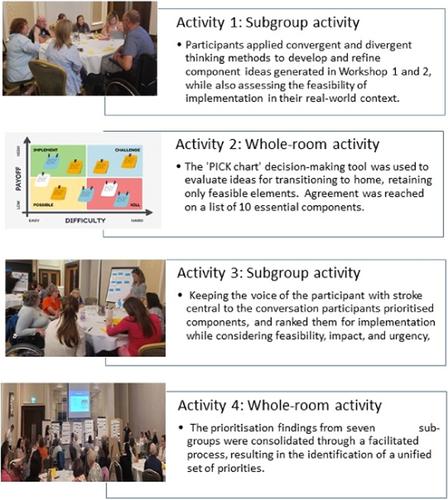From Hospital to Home: Applying a Co-Design Approach to Determine the Key Components of an Intervention to Support Transition-To-Home After Stroke
Abstract
Background
People with stroke and their families face numerous challenges as they leave hospital to return home, often experiencing multifaceted unmet needs and feelings of abandonment. The essential elements of an intervention intended to support transition-to-home after stroke are unclear.
Objective
The aim of the project was to engage in a co-design process to identify the key components of a pragmatic intervention to inform a transition-to-home support pathway following stroke.
Materials and Methods
The study was conducted using a co-design process engaging multiple stakeholders, including 12 people with stroke, 6 caregivers, 26 healthcare professionals and 6 individuals from stroke organisations in a series of three workshops, facilitated by the primary researcher, a wider team of researchers and an individual with lived experience of stroke. World Café methodology and Liberating Structures facilitation techniques were adapted to meet the aim of the workshops. Data collection involved observations during workshops, followed by summarising of findings and reaching group consensus agreement on outputs. Facilitated consensus on a prioritisation task resulted in the final output.
Results
The co-design group identified 10 key intervention components of a transition-to-home support pathway following stroke. These components focussed on enhancing collaboration, streamlining transition processes and facilitating post-discharge support. While a stroke coordinator was considered a top priority, increased cross-setting information sharing and community in-reach, where community-based healthcare staff extended their services into hospital settings to provide continuity care, were considered most feasible to implement.
Conclusion
The co-design approach, involving a multi-stakeholder group and strengthened by patient and public involvement, ensured that the identified transition-to-home intervention components are meaningful and relevant for people with stroke and their families. Further co-design workshops are required to refine, and feasibility test the components for generalisability within the wider Irish healthcare setting.
Patient or Public Contribution
Individuals who have experienced a stroke actively contributed to shaping the methodological design of this study and the ethics process. They engaged in the analysis of co-design outputs and provided input for the discussion and recommendations regarding future research. An individual who had experienced a stroke formed part of the research team, co-facilitating the co-design workshops and co-authoring this article.


 求助内容:
求助内容: 应助结果提醒方式:
应助结果提醒方式:


